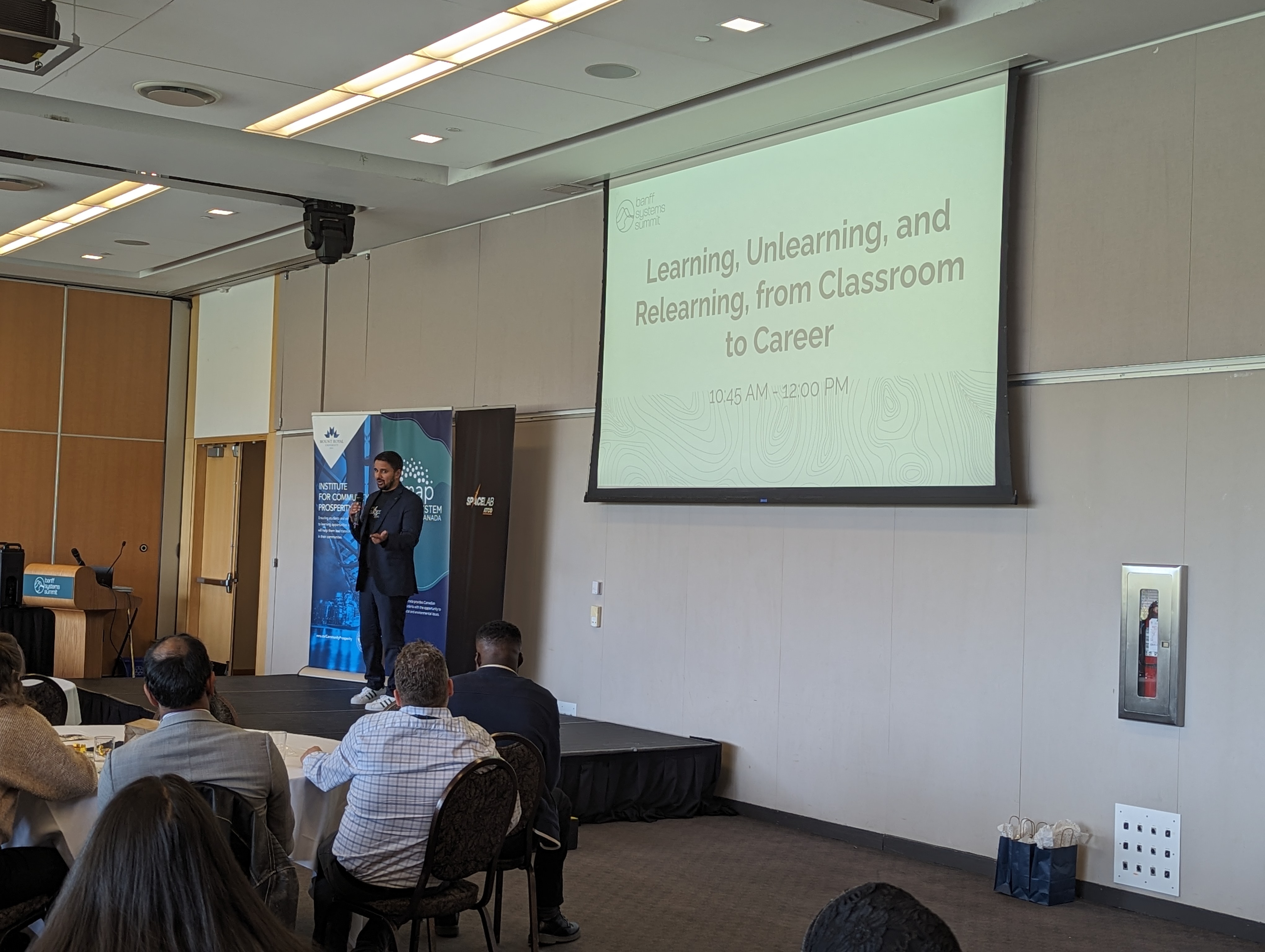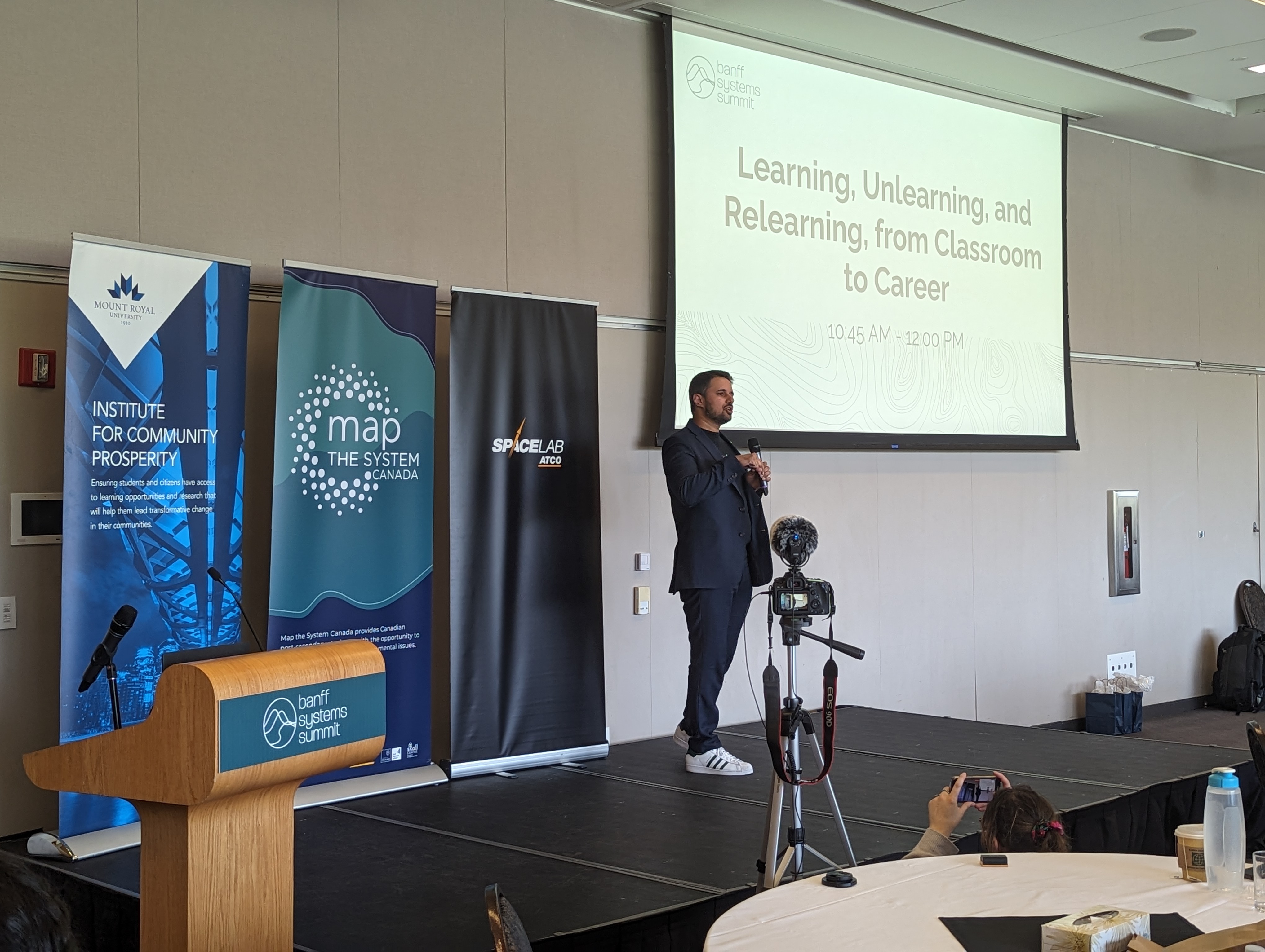Chapter 10: Learning, Unlearning, and Relearning, from Classroom to Career
Posted September 13, 2024 - compiled by Linh Bui
Philanthropy may play a much smaller role than government in funding social impact (roughly 1:20 is the ratio, just in terms of dollars), but philanthropy also has a unique capacity to experiment boldly, be relentlessly future-focused, and ultimately play a catalytic role in shifting systems.
Image description: Community and student participants at the Banff Systems Summit 2024 were spotted gathering and discussing after a session.
Hear about Aatif’s incredible journey as a changemaker with a diverse background spanning engineering, social policy, and technology management. Learn about Northpine’s vision for venture philanthropy, revolutionizing social impact, and creating sustainable systems to improve social outcomes continuously. The Northpine Foundation supports ventures to achieve scalable outcomes for underserved and underinvested communities in Canada. With a portfolio that includes refugees and formerly incarcerated persons, Scarborough, Winnipeg and Newfoundland and Labrador, Northpine funds approximately $50 million annually and is on a path to deploy $1 billion over the next decade. Northpine is pioneering a tailored financing model that includes grants, loans, equity, and blended finance while building deep relationships to work with investees to learn, unlearn, and relearn.
Panelist:

Image Description: Aatif Baskanderi led the key note session 'Learning, Unlearning, and Relearning, from Classroom to Career.'
Lessons on Career Development
Embrace Every Learning Experience
One of the key takeaways from Aatif’s journey spanning engineering, social policy, and technology management is the importance of seizing every opportunity to learn. “Take every learning from every opportunity,” he advises. Whether it’s a formal education or a job that seems disconnected from your ultimate goals, each experience contributes to your growth and understanding. Baskanderi’s own career trajectory—starting from his engineering role at BlackBerry to his work in social policy development—demonstrates the value of diverse learning experiences.
Be Flexible and Open to Diverse Paths
A career in systems thinking, as Aatif highlights, is inherently diverse. "A career in systems thinking is going to be very diverse," he notes. It may lead you to unexpected places, such as working with faith leaders in Sierra Leone or developing cleantech policies for the government. The key is to remain open to these possibilities and to adapt as your career evolves.
Live Your Unique Story
Aatif’s emphasis on authenticity is a powerful reminder to stay true to oneself. “Live your authentic stories, tell your own stories,” he urges. His own journey—from a small, inclusive community in Newfoundland to a speaking tour that turned into a crowdfunded documentary—illustrates how personal narratives can resonate on a global scale. By embracing and sharing your unique experiences, you can create meaningful connections and inspire others.
Insights on Philanthropy and Social Impact
Insights on Philanthropy and Social Impact
Philanthropy plays a unique role in social impact, distinct from government efforts. Aatif highlighted that while government funding dwarfs philanthropic contributions, philanthropy can experiment and be future-focused. However, he also stresses that philanthropy must evolve to be structurally accountable to the outcomes for vulnerable populations. He explained, "Philanthropy is not about the amount of money, it is about the character of that money and how is it that our money can do things in different ways."
However, Aatif also emphasized the need to make philanthropy structurally accountable to outcomes for vulnerable populations. He illustrated this with a powerful example: "As Canadians, we spend $150,000 annually per person to incarcerate someone...and yet, 50% of people end up back in contact with the justice system within two years of leaving." This alarming statistic reflects a system that is not structurally accountable to the best outcomes for individuals. To address this, Aatif and his team at the Northpine Foundation worked with the Department of Corrections in Nova Scotia to explore alternative solutions. They proposed investing $20,000 per person to create better post-incarceration outcomes, which could reduce recidivism and homelessness. However, they faced challenges in redirecting government funds due to rigid structures and conflicting departmental priorities.
In the discussion, Aatif Baskanderi shared valuable lessons on the importance of empathy and collaboration in addressing systemic issues, particularly when working with government entities. He emphasized that without empathy, efforts can quickly devolve into mere criticism, which is counterproductive. Instead, Aatif advocates for understanding the individuals within the government who are genuinely interested in making change and finding ways to collaborate with them effectively.
He suggests that philanthropy can play a role in "de-risking" initiatives for the government by addressing the various risk factors involved helping them take on projects that might otherwise seem too risky. “And then because of the lack of empathy, it just turns into criticism. But when you actually realize that there are people in government that are interested in making change, and how is it that as philanthropy, we can say, okay, tell me what your risks are, and maybe we can help de-risk for you, and then you take it on afterwards. So we've kind of done that multiple times.”

Image Description: Aatif Baskanderi led the key note session 'Learning, Unlearning, and Relearning, from Classroom to Career.'
Aatif also highlighted the complexity of working with both the bureaucratic and political sides of government. While the bureaucratic side may involve understanding and mitigating risks, the political side often requires influencing priorities at a higher level. "On the political side, sometimes the strongest thing you can do is twist the arm at a political level and not a bureaucratic level. To be honest, I actually think what voter's think is one of the most challenging things in Canada and why many people in poverty stay in poverty."
Aatif's reflections underscore the need for a nuanced approach to systemic change, one that balances empathy with strategic collaboration and recognizes the intertwined nature of democracy, policy, and public opinion.
This example highlights the complexity of creating systemic change, particularly in collaboration with government entities. It also underscores the importance of focusing on incremental, evidence-based improvements rather than grandiose systems change. As Aatif put it, "Capital P philanthropy is not going to do a lick of system change if it doesn't find a way to connect into these other factors of society."
Building Relationships Across Sectors
For philanthropy to truly make an impact, it must build deep relationships across sectors. Aatif’s work with Northpine Foundation, which includes tailored financing models that combine grants, loans, equity, and blended finance, showcases the importance of collaboration. As he puts it, “Capital P philanthropy is not going to do a lick of system change if it doesn't find a way to connect into these other factors of society.”
Advice for Creating Social Impact
Focus on Understanding People and Problems
Innovation, according to Aatif, has little to do with technology and everything to do with understanding people and their problems. “The thing that made me good at innovation is 80% of my social sciences background and only 20% of my engineering background,” he says. It’s this deep empathy and understanding that enables true innovation. By having honest conversations and building authentic relationships, we can design solutions that address real pain points.
Narrow Your Focus and Say No Strategically
In a world where distractions abound, Aatif advocates for a focused approach. “Figure out what is the problem that you're obsessed with solving,” he advises, and then say no to anything that doesn’t align with that focus. This kind of intentionality is crucial for creating lasting social impact.
Measure Meaningful Outcomes
Finally, Aatif underscores the importance of measuring outcomes that truly matter. “Numbers are stories,” he explains. “It just depends on what number you're picking.” At Northpine, significant effort is put into identifying meaningful outcome metrics that reflect the real impact of their initiatives. This data-driven approach ensures that their efforts are aligned with the needs of the communities they serve.
The journey from classroom to career in systems thinking is filled with challenges, but also with opportunities for growth, learning, and impact. Aatif’s experiences and insights provide valuable guidance for anyone navigating this path. By embracing diverse learning experiences, living authentically, and focusing on meaningful outcomes, we can contribute to positive social change in our careers and beyond.
As Aatif eloquently puts it, “There’s no such thing as the social good sector. Social good can be done by anyone, in any sector, in any way if you pave the path forward.” The key is to approach each step of the journey with sincerity, excellence, and a deep commitment to making a difference.
Previous Chapter 9: Is the Policy System the Policy Problem? A Student Changemaker’s Perspective
Creating policies does not create systems change, it’s PR and a reason to/not to vote for you in the next election. Public policies are like wind and they blow through our Ani-to-pisi vibrating our collective being.

